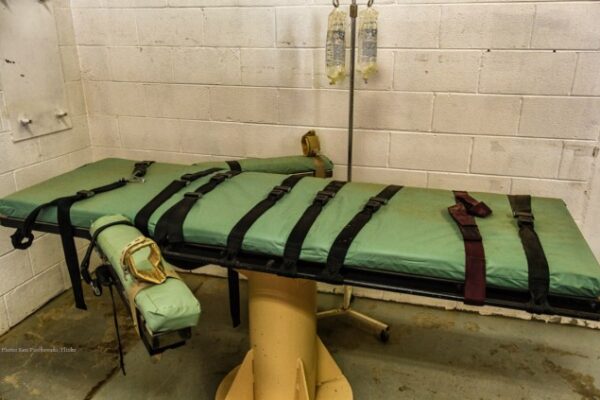By Hannah Cox, National Manager, Conservatives Concerned About the Death Penalty
What do Michael Bloomberg and Oliver North have in common? How about Michelle Malkin and Kim Kardashian West, or Ron Paul and Bernie Sanders? They may not share much turf when it comes to their political or social views, but they do all agree on one point that may surprise you.
They all oppose the death penalty.
Support for repealing the death penalty is diverse, it is growing, and it is bipartisan in nature. The brokenness of the death penalty system, long documented in local headlines and the cases they highlight, has hit a turning point with the public. This year alone, Republicans sponsored death penalty-repeal bills in ten states. That’s in keeping with trends that my organization, Conservatives Concerned About the Death Penalty, has been tracking since 2012.
I am a walking example of this trend.
Growing up as a conservative and as the daughter of a Southern Baptist minister, my views on the death penalty were for many years exactly what one might expect—absolutely pro. But I changed my stance after finally digging deeper, and learning just how frequently innocent people are caught up in the system. I learned about the outrageous costs of the death penalty’s operation. I learned that the death penalty does not deter crime. I learned of the extraordinary arbitrariness and racial bias in sentencing.
These are the reasons that many on the political right, like myself, are joining the opposition to capital punishment and fighting for repeal.
At the end of the day, the death penalty is another failed big government program marked by the same inefficiency and misallocation of resources found throughout almost all bureaucracies. The tenets of conservatism are straightforward: a belief in limited government, fiscal responsibility, and the protection of the sanctity of human life. The death penalty does not meet any of those metrics, so it makes sense that conservatives are abandoning it in droves.
It’s been a rough few years politically in our country. The divisiveness and the disagreements have left many Americans feeling as though we’ll never come together again. I would argue that our ability to band together despite differences in ethnicity, religion, socioeconomic status, and culture is what has made American civil society so strong for so many years. On this point, the encouraging thing that I see in my work and in the movement against the death penalty at large is it is providing those of us eager to find new common ground with an opportunity to work across the aisle, on an issue we can all agree is unjust.
As state legislatures across this country debated repeal bills, I’ve sat shoulder to shoulder in hearings with people from all walks of life: Democrats, Republicans, Libertarians; murder victims’ family members and death row exonerees; Baptist, Jewish, Catholic, and Unitarian religious leaders; retired law enforcement, state attorneys general, judges, and lawyers. The list goes on and on. We have come together despite perceived and actual differences in stations, beliefs, and backgrounds to eliminate this broken system. There is power in that.
In addition to the growing number of repeal bills across the nation, there are some other signs of success that point to Americans’ growing disapproval. New death sentences are actually down 60 percent since 2000, and last year was the fourth year in a row that the country carried out fewer than 30 executions. All 25 of those executions stemmed from just eight states, and Texas alone was responsible for over half of them.
In short, not only is usage of the death penalty down, it is concentrated and isolated.
I often say that support for the death penalty runs a mile wide and an inch deep. The minute someone takes time to examine the facts around the death penalty support quickly wanes. My elevator pitch response to “what do you do?” is almost always real-time evidence of this fact. There are simply too many problems with the system for us to allow it to continue.
Given all the progress we have made in repealing the death penalty in recent years, and the diversity of support that made it happen, I think it makes perfect sense for Conservatives Concerned About the Death Penalty and the ACLU to work together as the U.S. marches closer to ridding the nation of this broken system forever.
When those opportunities arise and we find issues that unite us, I believe we must choose to come together. And when we come together as Americans, we know big things happen and we can fulfill the promise of justice in our justice system, one defined by equity, conscience, and our shared values as a society.


